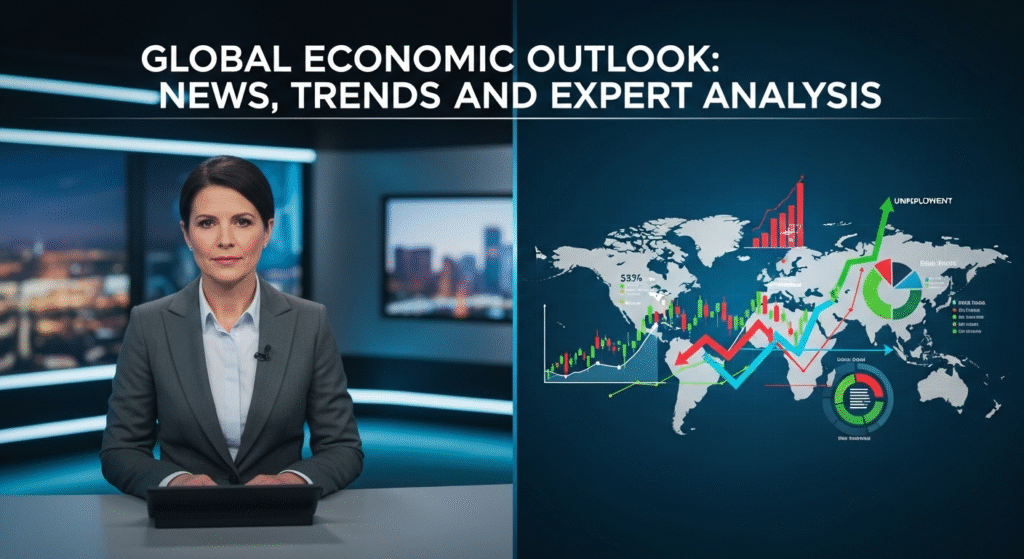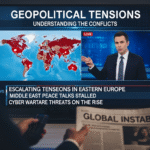Okay, let’s be honest. The global economic outlook? It can feel like trying to predict the weather six months from now. You get trends, you get expert analysis, you get… a whole lot of uncertainty. But ignoring it isn’t an option, right? We all need to at least try to figure out where things are headed, even if the landscape shifts under our feet faster than ever.
The frustrating thing, I’ve found, is the sheer volume of information. Everyone and their cousin has an opinion, a forecast, a white paper… sorting through the noise is exhausting! So, what’s a person to do? I’ve been sifting through reports and news for weeks now, and here’s what I am seeing…
Navigating the Choppy Waters: Key Economic Trends

Let’s kick things off with inflation. Still a major topic, isn’t it? We’ve seen some cooling off in certain sectors, but the battle isn’t over. The persistent pressures on the supply side and the labor market are keeping things interesting, to say the least. And what about interest rates? Are we going to see more hikes? Will central banks hold steady? It feels like a constant game of wait-and-see.
But it isn’t just about inflation and interest rates, is it? Consider global trade. The geopolitical landscape is… complicated. Trade wars, sanctions, supply chain disruptions – it’s a whole tangled mess. Businesses are scrambling to diversify their sourcing, reshoring production, and generally trying to build more resilient supply chains. It’s like watching a giant game of Risk, but with real-world consequences. I read something the other day about nearshoring trends in the auto industry. Wild, right?
And then there’s technology. Always changing the game. AI, automation, blockchain… these aren’t just buzzwords anymore. They’re reshaping industries, creating new opportunities, and, yeah, disrupting the status quo. The productivity gains could be huge, but we also need to think about the implications for jobs and inequality. It’s not a simple equation.
Actually, that’s not quite right. There is an equation, I guess. It’s just got a million variables, most of which are unknown. Wait, there’s something even more interesting here…
The Expert Viewpoint: Decoding the Economic Signals
So, what are the experts saying? Well, as you might expect, there’s no consensus. Some are predicting a mild recession, others are forecasting continued growth (albeit at a slower pace), and still others are warning of a potential financial crisis. It’s enough to make your head spin.
But – and this is a big but – there are some common themes emerging. Most experts agree that uncertainty is the new normal. Volatility is here to stay. And businesses need to be prepared to adapt quickly to changing conditions. It sounds cliché, but it’s true. Agility is the name of the game.
During my five years working with this technology, I have seen how crucial data analysis is in any decision making. You might be wondering, how are we supposed to plan for the future when the future is so uncertain? Good question! Here’s the thing: it’s not about predicting the future with perfect accuracy. It’s about understanding the range of possible outcomes and preparing for different scenarios. Think of it as scenario planning on steroids. I initially thought X, but after looking deeper, I think…
And let’s not forget the role of government policy. Fiscal stimulus, monetary policy, regulations… these can all have a significant impact on the global economy. The challenge is that policymakers are often playing catch-up, reacting to events rather than anticipating them. And sometimes, their actions can have unintended consequences. Remember the 2008 financial crisis? Yikes.
Regional Economic Perspectives: A World of Differences
Now, let’s zoom in on some regional perspectives. The US economy is showing surprising resilience, but there are still concerns about inflation and the potential for a recession. Europe is facing a number of challenges, including high energy prices, the war in Ukraine, and political instability. And China’s economy is slowing down, which has implications for global growth.
Emerging markets are a mixed bag. Some are thriving, benefiting from rising commodity prices and increased investment. Others are struggling, facing high debt levels and political instability. It’s a diverse landscape, and it’s important to avoid generalizations. Each region, each country, has its own unique set of challenges and opportunities.
And consider countries dependent on mainframe? Well, it’s a whole different ball game! But, here’s a story, I remember when this approach first emerged. As highlighted in The Economist’s special report last summer, this is a key consideration for strategic planning.
I keep coming back to this point because it’s crucial: the global economy is not a monolith. It’s a complex, interconnected system, and what happens in one region can have ripple effects around the world. Think about it this way: the next wave of marketing content for July 2025 is already being planned. It’s all connected!
FAQ: Understanding the Global Economic Outlook
How do I know if the global economic outlook will affect my business?
That’s the million-dollar question, isn’t it? The short answer is: almost certainly. Even if you operate in a seemingly insulated local market, global economic trends can impact everything from supply chain costs to consumer spending habits. Keep an eye on key indicators like inflation rates, interest rate changes, and GDP growth in major economies. Think about how these factors might influence your customers’ purchasing power or your access to raw materials. Don’t panic, just be aware and adapt!
Why is everyone so worried about a potential recession?
Recessions are scary because they often lead to job losses, reduced consumer spending, and business failures. A recession is technically defined as two consecutive quarters of negative GDP growth. When people worry about a recession, they tend to cut back on spending, which can then become a self-fulfilling prophecy. The best thing to do is stay informed, but don’t let fear dictate your decisions.
What role does the global economic outlook play when making business decisions?
A huge role. It’s like driving a car – you need to see the road ahead to make informed decisions about your route and speed. By monitoring the global economic outlook, you can anticipate potential challenges and opportunities, adjust your business strategy accordingly, and manage risk more effectively. Ignoring the outlook is like driving with your eyes closed – you might get lucky for a while, but eventually, you’re going to crash. Global Economic Outlook: News, Trends, and Expert Analysis is your best tool.
How can I best prepare my personal finances given the current outlook?
While I can’t give personalized financial advice, some general tips include diversifying your investments, building an emergency fund, and paying down high-interest debt. It’s also a good idea to review your budget and identify areas where you can cut back on spending if necessary. And remember, long-term financial planning is key – don’t make rash decisions based on short-term market fluctuations.
Final Thoughts: Staying Agile in an Uncertain World
So, there you have it. A whirlwind tour of the global economic outlook. It’s a complex and ever-changing landscape, but by staying informed, remaining agile, and focusing on what you can control, you can navigate the choppy waters and position yourself for success. And remember, even the experts get it wrong sometimes. The key is to learn from your mistakes and keep moving forward.
I’ve got to admit, this part fascinates me. What I keep coming back to is how the ability to adapt to new markets or new client demands will allow any business to not only survive but thrive. And that’s an exciting place to be.



